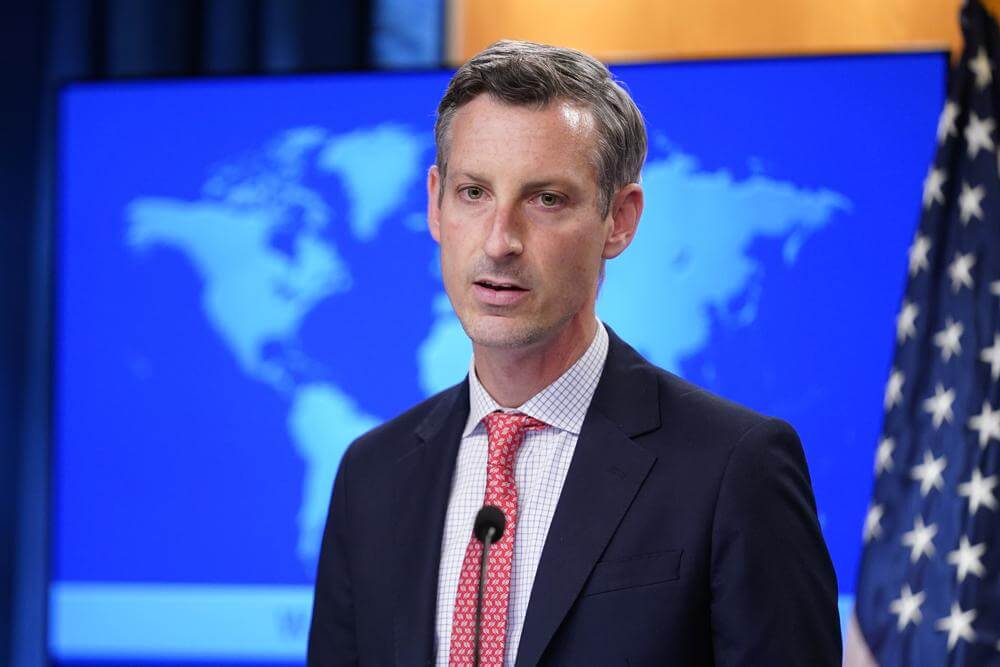During a briefing on Tuesday, United States (US) Department of State spokesperson Ned Price confirmed that the US and Russia will conduct talks under the New Strategic Arms Reduction Treaty (START) “in the near future.”
“We believe deeply, around the world, in the transformative power and the importance of diplomacy and dialogue,” Price said. While he hoped for a “constructive session,” he admitted that Washington is “clear eyed” and “realistic” about what the talks could accomplish. Though he did not reveal the venue or timing of the talks, he said they will be “focused on risk reduction” and aimed at ensuring that communication channels between the two countries “do not atrophy.”
US and #Russia have agreed to hold talks on resuming on-site #nuclear arms inspections under the new START treaty, announces @StateDeptSpox but he doesn't say when or where those discussions will occur.
— Steve Herman (@W7VOA) November 8, 2022
According to Russian newspaper Kommersant, the talks are slated to take place in a Middle Eastern country and not Geneva. Russia no longer considers Switzerland to be a neutral party after it imposed sanctions on Moscow following the Ukraine invasion. Some sources have said the venue could be Cairo.
The New START treaty restricts both nations to deploying 1,550 nuclear warheads on delivery systems, including intercontinental ballistic missiles, submarine-launched ballistic missiles, and bombers. However, the recently released Nuclear Posture Review accused Russia of continuing to “modernise and expand” its nuclear forces, with an active stockpile of 2,000 non-strategic nuclear warheads.
The New START treaty was extended for another five years in February last year, and Russia has expressed an interest in further extending the treaty.
Russia suspended cooperation with inspections under the treaty in August. It blaming travel restrictions imposed by US and its allies over the February invasion of Ukraine. However, Russia said it was still committed to complying with the provisions of the treaty.
— Gurbaksh Singh Chahal (@gchahal) November 8, 2022
It is the only treaty to regulate the largest nuclear arsenals in the world, and allows for on-site inspections in both countries. On-site inspections were mutually suspended in March 2020 due to the COVID-19 pandemic. In August of this year, Russia “unilaterally” suspended on-site inspections, claiming that US-led Western sanctions have deprived it of “the right to carry out inspections on American soil” due to travel restrictions.
In this respect, Price asserted, “We’ve made clear to Russia that measures imposed as a result of Russia’s unprovoked war against Ukraine don’t prevent Russian inspections,” and expressed hope that the Bilateral Consultative Commission (BCC) would allow the inspections to continue during the forthcoming discussions.
The last BCC, which is supposed to meet twice a year, last convened a meeting in October last year.
The US warned Russia of “catastrophic consequences” in light of its escalating threats regarding the use of nuclear weapons in Ukraine. During a press briefing on Monday, White House Press Secretary Karine Jean-Pierre confirmed that “lines of communication are not cut off” between the two countries. “We reserve the right to speak directly at senior levels about issues of concern to the United States. That has happened over the course of the past few months,” she stated, adding, “Our conversations have focused only on risk reduction in the U.S.-Russia relationship.”
While attending an event in New York on Monday, US National Security Adviser Jake Sullivan affirmed, “We have done so when it’s been necessary to clarify potential misunderstandings and try to reduce risk and reduce the possibility of catastrophe like the potential use of nuclear weapons.” Similarly, while speaking with his Russian counterpart Sergei Shoigu last month, US Secretary of Defense Lloyd Austin stressed “the importance of maintaining lines of communication amid the ongoing war.”
As we have said on many previous occasions, US is in regular back channel talks with Russia to avoid miscalculations, concerns about risks wrt Nuclear Weapons and crossing red lines. Washington does not want to end up going to war directly with Russia, wrt Ukraine itself.
— The Sirius Report (@thesiriusreport) November 9, 2022
These developments come days after the US released its Nuclear Posture Review, in which it described Russia as an “acute threat” that seeks to “use force to impose border changes and to reimpose an imperial sphere of influence,” citing the “escalation of its brutal, unprovoked war against Ukraine.” It also warned that China and Russia “could use a wide array of tools in an attempt to hinder US military preparation and response in a conflict, including actions aimed at undermining the will of the US public, and to target our critical infrastructure and other systems.”
The document also said that Pentagon would focus on deterring Russian attacks on the US, North Atlantic Treaty Organization (NATO) members, and other allies by “reinforcing our iron-clad treaty commitments, to include conventional aggression that has the potential to escalate to nuclear employment of any scale.”

